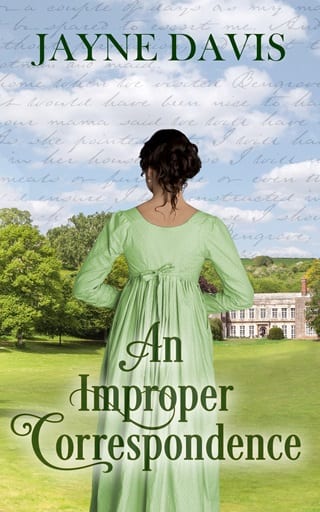Chapter 3
CHAPTER 3
B ayonne, southern France, December 1812
In the fading light, Captain Robert Delafield could just make out high stone walls through the windows of the chaise as it came to a stop. They must have arrived at Bayonne at last. Although his broken ribs were healing, they still hurt like the devil at the end of each day of this interminable journey from where they'd been captured in Spain. As did his leg.
"Now what's delaying us?" Captain Bengrove unhooked the strap with his left hand and let the window down. A cold breeze blew through the coach.
"Shut the bloody window, Bengrove," Rob said. "They'll be checking our papers." As they had at every town they'd passed through.
Bengrove swore and pulled the window up. After a few minutes, Sous-lieutenant Fournier opened the door. The young officer was in charge of their convoy with wounded prisoners from Burgos and the Allied retreat towards Salamanca. "Nous nous arrêtons ici. Je vais vous trouver un logement pour deux nuits ."
" Merci, Lieutenant ," Rob said. Fournier nodded and closed the door again .
"What did he say?" Bengrove demanded.
Rob's French wasn't very good, but combined with Fournier's limited English, they managed well enough. There wasn't much to be said, after all. "We're to stay here for two nights. He's gone to find lodgings." Perhaps one of the other wounded officers had taken a turn for the worse. He hoped not, but being jolted along in a carriage day after day was unlikely to speed anyone's recovery.
The chaise eventually took them to an inn. Bengrove headed straight for the taproom; his injured hand was still bandaged, but appeared to be healing well and didn't affect his appetite for ale and brandy. Rob was glad to see him go, cursing once again that Fournier had allocated Bengrove to be his companion for the journey. The man's continual complaints annoyed him, not to mention his boasts of the exploits of his cavalry troop, which only served to make him sound like an impetuous fool. Surely Bengrove couldn't be more than five or six years younger than him? Had Rob himself behaved in such an immature way when younger? He sometimes wondered if he was being too harsh on Bengrove, but then the man would tell another anecdote that only reinforced Rob's original opinion.
The landlady led Rob upstairs to a cramped little room, not bothering to hide her impatience at his slow progress, making full use of his crutch and the handrail. At least the sword slash in his left arm had healed well enough for him to use both hands to help him get up the stairs.
The furniture in the room was worn, the table wobbly on uneven legs, and paint was peeling from the window frame. It would do—it was at least clean, unlike some of the places they had stayed along the way. Unfortunately, the presence of two beds meant he would most likely be sharing this room with Bengrove.
Rob limped over to the nearer bed, dropped his crutch on the floor, and lowered himself carefully onto the lumpy mattress. His ankle was on fire after hobbling in from the coach, and he lay still until the worst of the pain had subsided. Then he stirred himself to wash his face and hands before lying down again. With any luck, Bengrove would spend the evening drinking instead of inflicting his presence on Rob. Bengrove cared as little for Rob as Rob did for him, but for different reasons. Bengrove, as a cavalry officer and the son of a viscount, even if only a second son, considered himself well above the status of a mere infantry captain, particularly one whose family had no connections whatsoever to the aristocracy.
His luck was in, and he didn't see Bengrove until the middle of the following morning. He suspected the man had spent the night with one of the women who frequented establishments like this. Rob was lying on the bed, bored, when Bengrove walked in.
"I need to write to my parents," Bengrove announced.
Rob kept his eyes shut. He should write too, but that meant venturing into the town to find pen and paper, and then finding out how to get the letter sent. That was too much for now. He hoped that someone had already notified his family that he was still alive, but there was not much he could do about it if they hadn't.
"I need to write home," Bengrove said again. "I can't write."
Rob opened an eye to see Bengrove waving his bandaged right hand at him. "No paper. No pen," he said, hoping that Bengrove would just go away again and let him rest.
"I don't know where to get them."
"You can ask Fournier, can't you?" Rob said impatiently.
"The frog doesn't speak English."
Rob suspected that Fournier didn't bother trying with Bengrove. " Je voudrais du papier. "
"What?"
"It means ‘I need some paper'," Rob said. "Find him and ask him. I'm not walking anywhere."
"You'll have to write it for me." Bengrove held his bandaged hand in front of Rob's face.
The bastard would pester Rob until he agreed. "Very well—if you get enough paper for me to write a letter, too, and pay Fournier whatever it costs to get them sent."
Bengrove scowled. "Pay your own bribes, farm boy."
"Write your own letter," Rob retorted, and closed his eyes. There was a tense silence, then Bengrove stamped out of the room .
Rather to Rob's surprise, Bengrove turned up that afternoon with paper, pen, and ink, and set them on the table. "Letters."
Well, it was something to do, and Rob did want to reassure his family. He hobbled over to the table and drew a piece of paper towards him.
"Just write and say I've arrived here safely," Bengrove instructed.
"You want me to write to your family? No. You can dictate and I'll explain why it's not your handwriting."
Bengrove glared at him for a moment, then shrugged. "Dear Papa," he started, and then gave a bald account of being wounded and captured. From things Bengrove had let fall on the journey, Rob suspected that the cavalry, as often happened, had got carried away and pursued fleeing soldiers too far. Naturally, Bengrove's account to his parents did not mention that. He finished with a request for them to send some funds to Verdun so he could pay for decent lodgings.
Rob blew on the ink to check it was dry, then folded the paper and wrote the address Bengrove dictated on the outside. Bengrove could get it sealed somewhere else, although he suspected that their letters would be read by the French before being sent on. Thinking he had finished, Rob was about to start his own letter when Bengrove said, "I must write to my betrothed as well."
"You're betrothed? You never mentioned that." In all the blathering about his father the viscount and their estates, hunters, carriages, servants, and status that Rob had been forced to listen to during the journey, he'd not yet heard that Bengrove was to be married.
"Don't want her thinking I've died; she might marry someone else," Bengrove said. "Can't afford to lose her now I've got her." The words didn't sound particularly lover-like, and his tone definitely was not. The letter he dictated included a few phases about missing her and the hope that she would write to him, but was otherwise little different from the letter to his parents. Rob added the same explanation at the top of it; that Bengrove had injured his hand and so Rob was writing for him, and folded it up. He felt a pang of sympathy for the woman who would have to share Bengrove's life and bed, but perhaps they deserved each other .
"You can give them to Fournier when you see him," Bengrove stated, and left without a word of thanks. Rob shrugged—at least with Bengrove gone he could write his own letter in peace. He addressed it to his eldest brother William, knowing that Will would make sure the rest of the family got to hear the news. Then he hobbled downstairs in search of food—tomorrow would be soon enough to give the letters to Fournier.
London, January 1813
A weak ray of sunshine shone through the window onto Jo's desk. She looked up from her notes—the clouds of the morning were clearing, and it could turn into a pleasant afternoon. It would not be warm enough to tempt Mama to take a breath of fresh air, though, not even in their tiny back garden. Mama's health, which had improved for a while after their stay at Yelden Court, had declined following the news that Alfred was missing.
In the two months since then, Jo had kept herself busy with her work for Papa, looking into investment proposals and new industrial developments. It was unfortunate that most of the friends she had made amongst the daughters of Papa's business acquaintances had now married and moved away from London, which left her too much time to think and remember. Then, she had to remind herself that Alfred was still listed as missing, not dead—it was possible he was still alive, and she must keep cheerful for Mama's sake. However, in her darker moments, lying awake in bed, she railed against fate for taking Alfred away after she had finally found a man she thought she could marry.
One morning, as she was finishing some notes on a manufactory proposal, she decided that the cold need not keep her indoors. She could exchange her novel at the circulating library, or see if any interesting books had arrived in the shops; she could still lose herself in accounts of travel in distant lands, or volumes of history. The butler knocked on the door as she was wiping her pen .
"A visitor has called, miss." Chivenor held out a silver salver with a card on it. "I informed her that Mrs Stretton is indisposed, but thought that you would wish to see her."
Jo's brows rose as she picked up the card. "Mrs Catherine Bengrove?"
"The wife of Lord Bengrove's heir, I understand. She is awaiting you in the parlour. I took the liberty of ordering refreshments."
"Thank you, Chivenor."
Jo inspected her hands; finding them free of ink stains, she headed for the parlour.
Mrs Bengrove was a petite woman, her soft brown hair arranged in curls across her forehead beneath a lacy cap. She could not have been much above Jo's age, and stood as Jo entered the room. The bulge around her waist indicated that there would be a happy event in several months' time.
"Mrs Bengrove, I am pleased to meet you," Jo said, gesturing for her guest to sit down.
"And I, you." Mrs Bengrove settled back into her chair with a smile.
"It was kind of you to call. We do not have a large circle of acquaintance amongst people who make regular morning calls."
"I came with news, Miss Stretton; good news. Lord Bengrove received a letter from Captain Bengrove. He has been taken prisoner."
Jo couldn't comprehend at first, then hope mingled with fear. "Oh, I am so pleased! That he is still alive, I mean. But is he well? Are you saying he is in prison?" The dire conditions in places like Newgate sprang into her mind.
"I believe he was injured, but not seriously. However, he may not be back with us for some time. He is being taken to Verdun, in the north of France. My husband says that officers give their parole and take lodgings in the town, much as French prisoners do here."
Jo felt limp with relief. Still, someone like Alfred, used to riding about the countryside, would find it terribly restricting.
Mrs Bengrove reached into an embroidered reticule and drew out a letter. "He wrote to you. This came with the letter for his father. Lord Bengrove sent it up to Town."
Jo took it, her hand shaking slightly. "Do you mind if I read it now?"
"Of course not." The door opened, and a maid entered with a tray of tea and queen-cakes. "Shall I pour the tea while you do so?"
"Oh, yes, thank you." She frowned, looking at the direction. It was in a different hand from the brief note she had received from Alfred several months ago. Had he been so badly injured that he could not write?
In some trepidation, she unfolded it. It was short, starting with an explanation from the unknown writer that Captain Bengrove's wounded hand had not yet healed sufficiently for him to write. His hand was injured, nothing more—thank goodness. There followed a brief account of Alfred's capture. Disappointingly, only the last few sentences contained anything personal.
I miss you, my dear. Memories of the conversations we had, our walks together, and your delightful smile, were all that got me through the tedious journey so far, and will ease the rest of the days until we reach Verdun. I hope you will write to me there—I'm afraid we may not see each other until the war is over.
"Is all well with him, Miss Stretton?" Mrs Bengrove asked.
"I believe so, although he says very little." She held the letter up. "He has an injured hand, so this was written by someone else."
"Ah." Mrs Bengrove nodded in understanding. "He could not say all he wished to."
Of course. He would write a more personal missive when he did not have to dictate the words to someone else.
Mrs Bengrove took another letter from her reticule. "Lord Bengrove sent this for your father. He invites you all to Bengrove Hall."
"Oh. Thank you." It would be interesting to see the place where Alfred had grown up—and perhaps Lady Bengrove would be friendlier than her husband had been.
"Tell me, what is Alfred like, Miss Stretton? If you don't mind me asking, that is. We will be sisters, eventually, will we not?"
"Have you never met him?"
Mrs Bengrove shook her head. "I first met Bengrove just over a year ago, and we were at Bengrove Hall when Alfred came back to England last summer." She paused. "I know what he looks like. There is a portrait of him in his regimentals done when he bought his captaincy—he is very handsome. But that is all I know. My husband says very little about the other members of his family."
"He is very charming. And friendly." She could not speak about the way his ardent gaze made her feel; her face warmed at the thought.
"Oh, silly me," Mrs Bengrove laughed. "I'm sorry; it was not my intention to embarrass you. I did not mean to pry into your private feelings."
There was an awkward pause. "Have you been in Town long?" Jo asked, for want of something better to say. The problem with her current lack of female acquaintance was that she didn't get much practice at making polite conversation.
"For a month or so." Mrs Bengrove rested her hand on her midriff. "Bengrove wanted me to be close to the best physicians, as this will be my first child."
"I hope they are not needed," Jo said, trying not to show her feelings; the best physicians had not been much help to Mama. "Will you take more tea?"
"Thank you, but no. I did not intend to stay long—you must have much to think about, with the news I brought. I would like to know you better, though. I cannot go about much at the moment, but if you wish to call, you would be welcome. Mrs Stretton, as well, when she is recovered from her indisposition."
"Thank you." Mama would wish her to go, even if she were too unwell to venture out herself.
Mrs Bengrove pushed herself to her feet, and repeated the invitation to call. When she had gone, Jo went up to Mama's room and found her sitting up in bed watching Halsey set out her clothing.
"Halsey says you had a visitor."
"Yes, Mama. Mrs Bengrove came to call." Jo sat on the end of the bed, in spite of her mother's half-hearted protest. "The family has received letters from Alfred. Mrs Bengrove brought the one that was for me. He has been taken prisoner. He is injured, but not too badly."
"Oh, Jo! Oh, I am pleased for you. And for him, of course. Such a pity he will not be coming back soon, though."
"Mrs Bengrove invited me to call, and you, too, if you are well enough."
"Jo, dear, I'm so happy that you are making friends with the right people!"
Jo frowned. "Mama, Papa's friends are not the wrong people!"
"Yes, of course, dear. But I do want you to be able to mix with… well, with people of higher rank, as well."
"Now, Mama, you talk as if you regret marrying Papa!" Jo softened her remark with a smile.
"You know that's not true, dear. I will certainly accompany you if I feel well enough, but you must promise me that you will go without me if necessary."
"I promise." She bent down to kiss Mama's cheek. "You may remind me of the topics allowed for polite conversation when you come downstairs."
 Fullepub
Fullepub 



